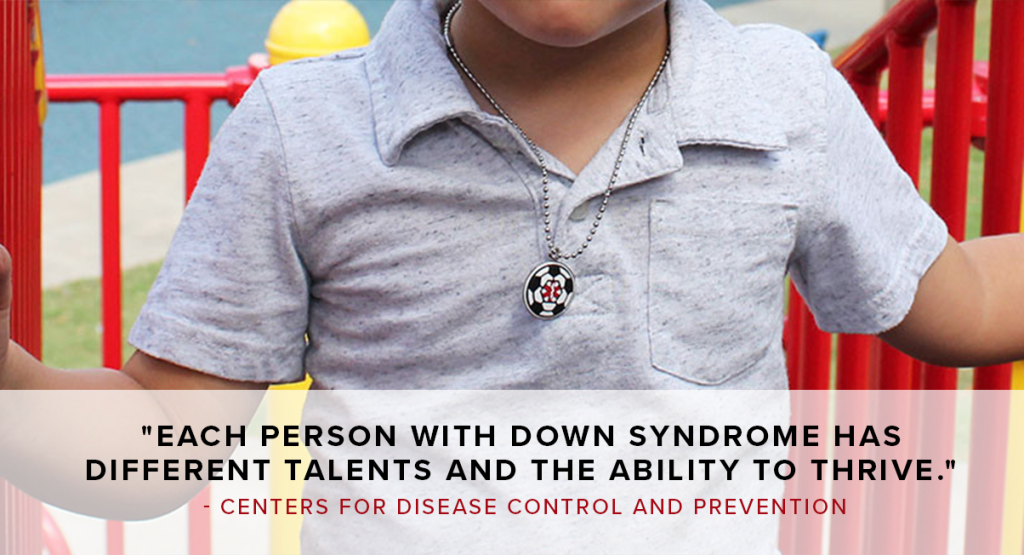
Down syndrome is a chromosomal disorder that occurs in approximately 1-10 out of every 1000 live births all over the world according to the World Health Organization making it the most common cause of chromosomal intellectual disability that ranges from mild to moderate.
In the United States, Down syndrome represents the commonest chromosomal disorder, affecting 1 in 700 babies born. Occurring in both sexes, ethnic and economic groups approximately equally, Down syndrome arises from genetic mutations that occur in three possible ways:
- Trisomy 21- which is the possession of an extra chromosome 21 in all the body cells, and alone, making up about 95% of the cases of Down syndrome.
- Translocation- in which case, three 21 chromosomes are present but genetic material from the extra chromosome is bound to another chromosome.
- Mosaicism – which is a rarer form of the disorder and is characterized by a mixed picture of the above two.
Regardless of the type, every Down syndrome child manifests varying levels of intellectual disability and therefore requires special care.
What Special Care Do Down Syndrome Children Need?
Every child is unique in their own way and this is no different for children born with Down syndrome.
However, certain common underlying features would be present in them which would necessitate closer attention, and some of them include:
Hypotonia – almost every Down syndrome child has low muscle tone and this means weak and sometimes floppy muscles that may affect their general ability to stand, sit up, talk, etc. Physical therapy has been shown to be quite effective in improving this.
Hearing difficulties – A good proportion of Down syndrome children are affected by hearing loss, either congenital or resulting from repeated middle ear infection that affects up to 50-70% of them. A varied range of hearing aids is available to help them with hearing.
Visual difficulties – such as short-sightedness, long-sightedness, cross eyes, etc. These can, fortunately, be corrected with the use of eyeglasses.
Thyroid Problems – Hypothyroidism is a common condition in Down syndrome individuals, affecting about 13 to 50% of the adults according to the NDSS, and requiring life-long treatment with thyroid replacement hormones.
Heart Defects – “Approximately 50% of down syndrome infants have a heart defect”, says the National Down Syndrome Society (which goes on to stress the serious implications of these heart defects and the importance of their understanding so that appropriate steps can be taken towards care). Some of them may be managed conservatively, while some may require surgery and/or the use of medical implants.
While there is no cure for the disorder, a lot can be done to improve their quality of life that involves early identification of health risks and timely intervention.
Some notable advances have been made in Down syndrome research including the possible use of blood to diagnose and possibly predict Alzheimer’s disease which they’re more susceptible to and the development of health apps (like the Health Swap) for Down Syndrome persons to encourage them to live more active and healthy lives.
Why You Must Include Medical IDs In The Care of Your Down Syndrome Child
Children with Down syndrome are prone to a lot of medical conditions as we have seen. However unique your child may be in manifesting the symptoms of down syndrome, there is a general impairment in social skills, which affects their understanding and interactions with the outside world.
What happens if your child wanders off and you’re not there to speak for them and help them get back safely?
What happens if your child has a medical emergency and they’re not able to give any relevant information that could inform split-second decisions by the medical emergency team that could impact their lives going forth?
In what ways can medical IDs be of help in the care of your child?
Emergency situations requiring alternative airway establishment
A lot of Down Syndrome children are known to have some anatomical peculiarities that increase their risk of airway trauma when intubation is required. Some of these anatomical features include:
- Dental abnormalities
- Mandibular protrusion as a result of a large tongue compared to a small oral cavity
- Thickened, fissured lips or tongue
- Large tonsils and adenoids
- Choanal stenosis (a narrowing of the nasal apertures)
- Glossoptosis, an abnormal formation of the tongue
- A tendency to have smaller tracheal diameter, etc.
As a result of these, special care is taken by Emergency medical services (EMS) providers during airway intubation and it is recommended that they use endotracheal tubes two or more sizes smaller than usual to minimize associated risks. Having knowledge of your child’s medical diagnosis would be very beneficial to them at this point.
In addition to the above, Down syndrome is associated with cervical instability and therefore, they’re at a higher risk of atlantoaxial dislocation during attempts to establish an alternative airway.
Realizing this, the EMS often opts for simpler methods of airway ventilation until a well-equipped facility is reached before attempting intubation.
Readily available information not just about your child’s diagnosis but about other relevant related details can help prevent complications which are very much avoidable.
Medications allergy
Drug allergy information can be included on a medical ID. This is to improve your child’s safety by preventing them from being given drugs that could trigger allergies that would worsen the situation.
In-Situ devices
Information about indwelling medical devices like pacemakers, shunts, or hearing aids can help with management.
Identification
When your child wanders off as most children have a tendency of doing, you don’t have to go into panic mode any longer, knowing that the information contained on the medical ID is sufficient to identify them and take necessary steps towards ensuring their safety. Some medical IDs bear contact details in case of emergencies (ICE).
March 21 is World Down Syndrome Awareness Day
March 21, 2020 is World Down Syndrome Awareness Day. It is dedicated to letting the world know what they should about Down syndrome and what it’s like for people who have the condition.
More importantly, it aims to teach the public that there’s more to Down syndrome individuals than the disabilities that are more commonly associated with them.
In the spirit of improved care for Persons with Down Syndrome, get your child a medical ID today.
The Centers for Disease prevention and control (CDC) recommend medical IDs for persons with special needs, including those with invisible disabilities as well as a list of other medical conditions.
A medical ID could literally save their lives. Some of these custom-engravable IDs can be worn as a bracelet, a necklace, a sports band, or an anklet that is recommended for infants. They are quite successful in striking a fine balance between aesthetics and functionality.
About the author

Dr Callista Chinenye Emecheta is a Medical Doctor, Writer, and a Public Health enthusiast, whose love for writing gives her an opportunity to spread health awareness, reaching out to people across the globe and helping them live healthy and balanced lives.




